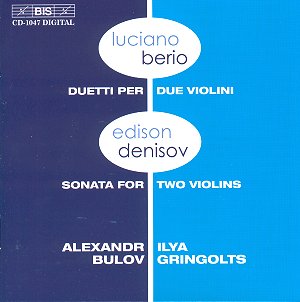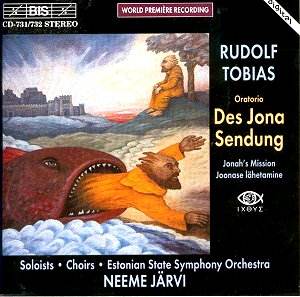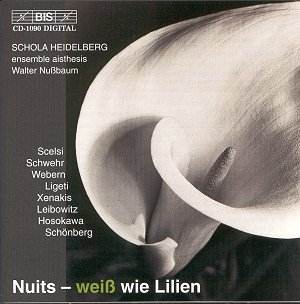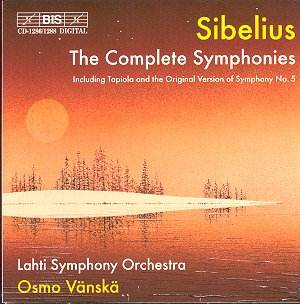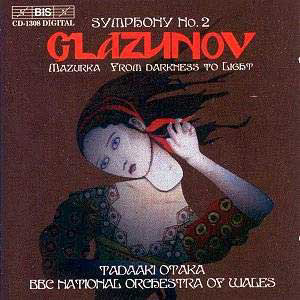 Composer: Alexander Glazunov
Composer: Alexander Glazunov
Works: Symphony No. 2 in F# minor Op. 16, Mazurka in G Op. 18, From Darkness to Light Op. 53
Performers: BBC National Orchestra of Wales, Tadaaki Otaka (conductor)
Recording: Brangwyn Hall, Swansea, Wales, 3 and 4 March 2001
Label: BIS
The music of Alexander Glazunov, a composer whose works often linger in the shadows of the Russian repertoire, finds a vibrant voice in this recent recording featuring his Symphony No. 2 alongside two lesser-known pieces. Composed in 1886, Symphony No. 2 is emblematic of Glazunov’s early style, which draws upon the rich lineage of Russian orchestral music while also reflecting the influences of his contemporaries. Dedicated to Franz Liszt, the symphony asserts itself with a bold unison statement that immediately establishes the thematic material. The work’s lush orchestration and rhythmic vitality reveal both the promise of Glazunov’s talent at a young age and the broader musical currents of his time.
Tadaaki Otaka’s interpretation of the Symphony No. 2 is marked by a keen understanding of its structural nuances. The opening movement unfolds with an expansive lyricism, and Otaka deftly navigates the delicate contrasts between the work’s sweeping melodies and its more intricate, contrapuntal passages. The thematic development recalls the expansive approach of Borodin, particularly in the way Otaka articulates the flowing lines while maintaining a steadfast forward momentum. The scherzo, with its lively syncopations, benefits from Otaka’s energetic direction, capturing the zest of the music without sacrificing clarity in the orchestral textures. However, the finale presents challenges; as the composer himself acknowledged, it remains a less resolved conclusion, with Otaka managing to imbue it with a sense of urgency that mitigates its structural shortcomings.
The inclusion of the Mazurka and From Darkness to Light offers a delightful complement to the symphony, showcasing Glazunov’s versatility. The Mazurka, a dance suite, invites the orchestra to embrace its folk roots, and here, Otaka’s rhythmic precision is particularly commendable. The players exhibit a palpable sense of joy, executing the dance’s lively motifs with both flair and finesse. In contrast, From Darkness to Light serves as a more introspective work, revealing Glazunov’s burgeoning complexity as a composer. The orchestral fantasy, dedicated to Ferruccio Busoni, presents a more chromatic language, hinting at the modernism that would later permeate the 20th century. Otaka’s careful pacing allows the listener to appreciate the intricate contrapuntal strands, and the orchestra’s principal players shine in their individual contributions.
The recording quality is exemplary, with BIS’s engineering providing a rich, detailed soundscape that enhances the orchestral colors. The balance between sections is meticulously managed, allowing the brass and woodwinds to emerge distinctly without overshadowing the strings. This clarity is vital in Glazunov’s music, where textures can often become dense. The sound quality here invites the listener into the hall, making the performance feel immediate and engaging.
Comparatively, this recording stands favorably against other notable interpretations of Glazunov’s works, particularly those within Naxos’s ongoing series. While Naxos offers comprehensive coverage of Glazunov’s oeuvre, Otaka’s direction with the BBC National Orchestra of Wales brings a freshness and vigor that revitalizes familiar scores. The interpretative choices made here convey a deep respect for the composer’s intent while simultaneously revealing the inherent charm and complexity of the music.
This recording of Glazunov’s Symphony No. 2 and accompanying works is a compelling testament to the composer’s melodic and orchestral prowess. Under Tadaaki Otaka’s insightful leadership, the BBC National Orchestra of Wales delivers a performance that is both polished and vibrant, ensuring that Glazunov’s music resonates with contemporary audiences. The careful attention to detail, coupled with a strong sense of character in each piece, makes this disc an essential addition to the repertoire, illuminating the rich tapestry of Glazunov’s contributions to classical music.
